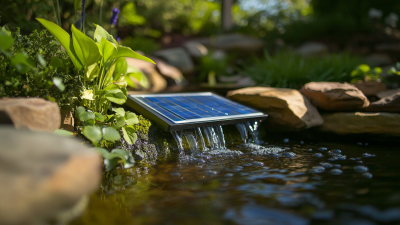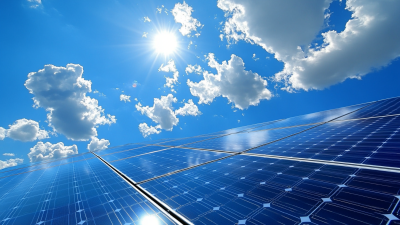Exploring the Benefits of Water Solar Systems for Sustainable Energy Solutions
In recent years, the pursuit of sustainable energy solutions has led to the increased adoption of innovative technologies, one of which is the Water Solar System. These systems, designed to integrate solar energy harnessing with water heating, are becoming essential in the transition towards renewable energy sources. According to a report by the International Renewable Energy Agency (IRENA), the global solar water heater market is expected to grow at a significant rate, potentially reaching over 100 million systems installed by 2025. This growth is driven not only by environmental concerns but also by the economic benefits associated with reduced energy costs.

Furthermore, the use of Water Solar Systems can lead to a decrease in carbon emissions, supporting the global commitment to combat climate change. As governments and organizations worldwide seek to fulfill their sustainability goals, understanding the advantages of Water Solar Systems becomes crucial for both consumers and businesses alike.
Understanding the Science Behind Water Solar Systems and Their Functionality
Water solar systems, also known as solar water heating systems, harness the sun's energy to heat water for residential and commercial use. At the core of these systems lies a simple yet effective mechanism: solar collectors, typically installed on rooftops, absorb sunlight and convert it into heat. This heat is then transferred to a fluid, which circulates through the system and warms the water stored in a tank. The efficiency of this process depends on several factors, including the type of collector, the temperature differential, and the intensity of sunlight.
The functionality of water solar systems extends beyond just heating water. Advanced systems incorporate intricate controls and monitoring technologies that optimize performance and energy efficiency. Some models utilize a heat exchanger to transfer solar heat directly to the water, minimizing energy loss. Additionally, these systems can be integrated with existing water heating solutions or used as a standalone system, making them versatile for various applications. As a sustainable energy solution, water solar systems not only reduce reliance on fossil fuels but also contribute to lower energy bills and a smaller carbon footprint.
Benefits of Water Solar Systems for Sustainable Energy Solutions
Why Water Solar Systems are a Game Changer for Renewable Energy Sources
Water solar systems represent a transformative approach to renewable energy, significantly enhancing the efficiency and sustainability of energy production. By integrating solar technology with water bodies, these systems leverage the natural cooling properties of water to improve the performance of photovoltaic panels. This innovative synergy not only increases energy output but also reduces the land footprint typically associated with traditional solar farms, making it an ideal solution for densely populated or environmentally sensitive areas.
Furthermore, water solar systems contribute to the sustainability of aquatic ecosystems. By reducing evaporation rates in water reservoirs and ponds, they help maintain water levels and prevent habitat loss for aquatic life. Additionally, these installations can be seamlessly integrated into existing water management practices, offering both energy and environmental benefits. As cities and regions strive to meet growing energy demands while minimizing ecological impact, water solar systems stand out as a game changer in the quest for sustainable energy solutions.
Evaluating Economic Benefits: Cost Savings through Water Solar Systems
Water solar systems, also known as solar thermal systems, harness the power of the sun to generate energy for heating water. As more households and businesses adopt these systems, the economic benefits become increasingly apparent. By utilizing sunlight, water solar systems significantly reduce reliance on traditional energy sources, leading to substantial cost savings on energy bills. In regions with abundant sunlight, home and business owners can see a dramatic decrease in their monthly utility costs, often recouping their initial investment in just a few years.
Moreover, the installation of water solar systems can enhance property value. Homebuyers are increasingly looking for energy-efficient solutions, and properties equipped with such systems are viewed as more desirable. Additionally, many governments offer incentives, such as tax credits and rebates, to encourage the adoption of renewable energy systems. These financial benefits, combined with the long-term savings on energy costs, create a compelling case for investing in water solar technology. By shifting towards sustainable energy solutions, individuals can not only improve their financial standing but also contribute to a greener future.

The Environmental Impact of Water Solar Systems on Sustainability Efforts
Water solar systems, often considered a game-changer in sustainable energy solutions, have significantly positive environmental impacts that contribute to global sustainability efforts. According to the International Renewable Energy Agency (IRENA), solar energy can potentially reduce global carbon emissions by up to 70% by 2050 if implemented extensively. By harnessing the sun's power to heat and convert water into energy, these systems not only provide clean energy but also minimize the ecological footprint associated with fossil fuel consumption.
Furthermore, a study by the U.S. Department of Energy highlights that water solar systems can enhance water conservation. These systems are particularly effective in arid regions, where traditional energy production often leads to excessive water usage. For instance, solar thermal technologies can require up to 90% less water than conventional power plants. By integrating water solar systems into our energy grid, we can not only reduce greenhouse gas emissions but also alleviate the strain on precious water resources, thereby promoting a more sustainable future.
Exploring the Benefits of Water Solar Systems for Sustainable Energy Solutions
| Benefit | Description | Environmental Impact | Sustainability Contribution |
|---|---|---|---|
| Renewable Energy Generation | Utilizes solar energy to produce electricity and heat. | Reduces carbon footprint by minimizing reliance on fossil fuels. | Promotes long-term energy sustainability by using abundant resources. |
| Water Conservation | Integrates water bodies for cooling and energy production. | Minimizes evaporation and preserves local water resources. | Supports sustainable water management in energy production. |
| Biodiversity Enhancement | Promotes aquatic ecosystems through properly designed installations. | Encourages habitat creation for marine life. | Aids in the conservation of local wildlife and ecosystems. |
| Job Creation | Stimulates local economies through the development of water solar projects. | Increases employment opportunities in renewable energy sectors. | Supports economic sustainability in communities. |
| Reduced Heat Islands | Helps to cool urban areas through water bodies and solar technology. | Lowers local temperatures, leading to decreased energy demand. | Enhances urban sustainability via improved climate conditions. |
Why Water Solar Systems Enhance Energy Security in Modern Society
 Water solar systems are rapidly gaining recognition for their potential to enhance energy security in modern society. According to the International Renewable Energy Agency (IRENA), the use of solar energy combined with water systems can significantly reduce reliance on fossil fuels. In fact, IRENA reports that integrating solar water heating technologies can lead to a
20-40% decrease in energy consumption for heating purposes, which is crucial in regions facing energy shortages or fluctuating prices.
Water solar systems are rapidly gaining recognition for their potential to enhance energy security in modern society. According to the International Renewable Energy Agency (IRENA), the use of solar energy combined with water systems can significantly reduce reliance on fossil fuels. In fact, IRENA reports that integrating solar water heating technologies can lead to a
20-40% decrease in energy consumption for heating purposes, which is crucial in regions facing energy shortages or fluctuating prices.
Furthermore, the deployment of water solar systems contributes to stabilizing the energy grid. The U.S. Department of Energy highlights that distributed solar water systems can provide resilience against power outages, particularly in vulnerable communities. By generating energy locally, these systems mitigate the risks posed by centralized grid failures and promote greater energy independence. With projections indicating that solar-powered water systems could supply up to
30% of the global water heating demand by 2030, the implications for energy security are enormous, paving the way for a more sustainable and resilient energy future.
Related Posts
-

Exploring the Surge of Solar Pumps Demand at the 137th Canton Fair: Insights and Opportunities
-

Unleashing the Potential of Solar Powered Pumps at the Record Breaking 137th Canton Fair
-

Discover Premium Solar Pond Pumps from the Leading Manufacturers in China
-

How to Choose the Best Water Solar Panel for Efficient Energy Solutions
-

Global Leadership in Solar Solutions Best Solar Powered Pumps from China
-

Exploring Real Life Applications of Best Solar Pumps in Agriculture and Industry
Contact Details
Address:
Solar Pump Solutions,
Borrisokane, Co. Tipperary, Ireland.
